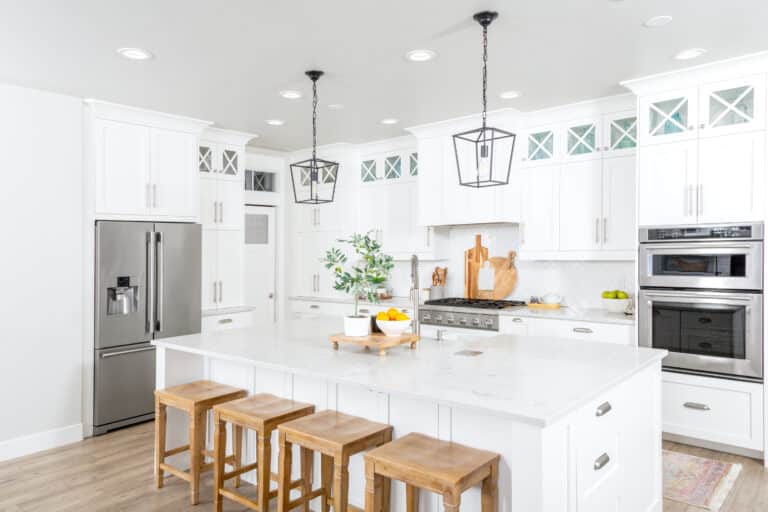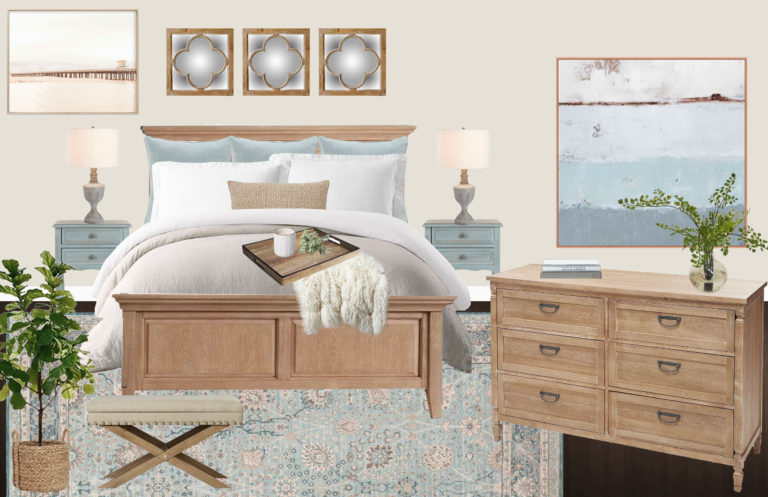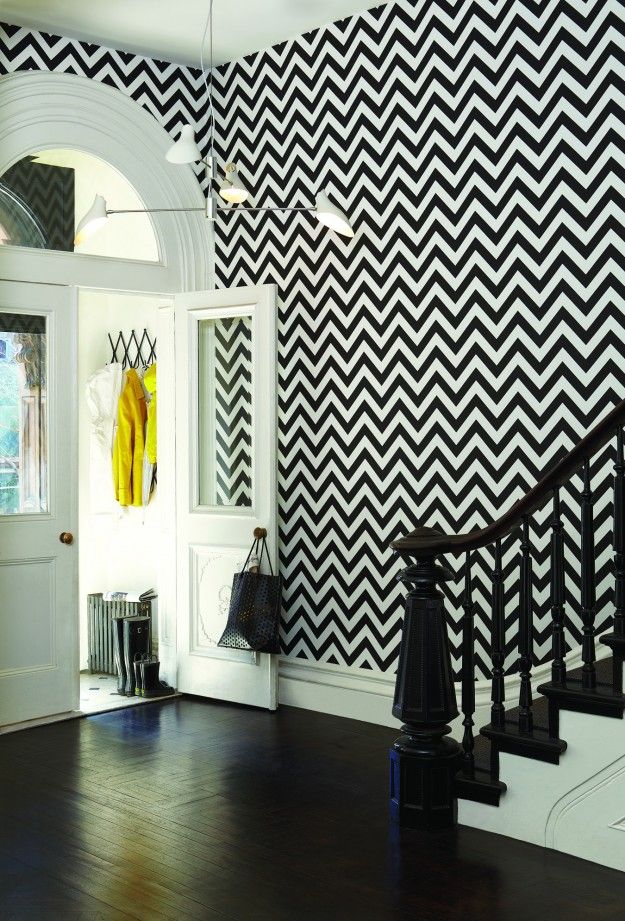Choosing the perfect countertops is key to creating a functional, durable, and beautiful kitchen or bathroom. With so many options available, each offering unique benefits, it’s important to understand the best materials for countertops so you can make the right decision for your space. In this guide, we’ll explore some of the most popular countertop materials, including the pros and cons for each. Whether you’re remodeling a bathroom, or building a kitchen from scratch, you can use this guide to find the best countertop material for your home.
I’ve been lucky enough to live in several different houses throughout my life, each with their own kitchen countertop materials. So, I have first-hand experience with granite, laminate, quartz, and solid surface countertops. I’ll give you an overview of each material, along with some tips and insights from my personal experience.
1. Granite Countertops
Granite countertops have been a top choice for decades due to their durability and natural beauty. Each slab of granite is unique, offering a one-of-a-kind look that’s both timeless and versatile. In my experience, granite has been a great material for countertops, and I didn’t have to seal it very often. It offers a unique look, with natural speckling and a variety of colors, but can be a little busy for today’s kitchens.
- Pros:
- Durability: Granite is heat-resistant, scratch-resistant, and can withstand daily use in a busy kitchen.
- Natural Beauty: Each slab has unique colors and patterns, adding elegance to any kitchen.
- Heat Resistance: Withstands high temperatures, allowing you to place hot pots directly on the surface (though trivets are recommended).
- Cons:
- Maintenance: Granite requires regular sealing to prevent stains and maintain its appearance.
- Cost: High-end granite can be expensive, though mid-range options are available.
- Best Material For: Those who want a natural stone look with a variety of colors and patterns, and don’t mind periodic maintenance.
- Designer Top Picks for Granite: Andromeda White, Alaska White, Colonial White, Absolute Black

2. Quartz Countertops
Engineered quartz countertops are known for their durability and wide variety of colors and patterns. Quartz is made from natural quartz crystals combined with resins, providing the beauty of stone without the maintenance. I loved my quartz countertops in our last home, because they were so easy to clean.
- Pros:
- Low Maintenance: Quartz doesn’t require sealing, making it easy to clean and maintain.
- Stain and Scratch Resistance: Quartz is highly resistant to stains, scratches, and water damage.
- Variety: Available in a wide range of colors and patterns, including options that mimic marble or granite.
- Cons:
- Heat Sensitivity: Quartz is less heat-resistant than natural stone, so you’ll want to avoid placing hot pans directly on the surface.
- Cost: Quartz is typically priced higher than laminate or solid surface materials.
- Best Material For: Homeowners looking for a low-maintenance, durable countertop with a wide range of color options.
- Designer Picks for Quartz: Calacatta quartz (multiple variations), Statuario White, Blanca Arabescato, Charcoal soapstone quartz

3. Quartzite Countertops
For those who love the look of marble but want better durability, quartzite is a fantastic choice. Just so you know, quartz and quartzite are not the same thing! Quartzite is a natural stone formed from sandstone, offering unique veining and colors similar to marble, while quartz is an engineered material.
- Pros:
- Durability: Harder and more resistant to scratches than marble, making it ideal for busy kitchens.
- Heat Resistance: Withstands high temperatures, so you can place hot pots and pans on it with caution.
- Natural Beauty: Features unique veining and colors that give a luxurious, high-end appearance.
- Cons:
- Requires Sealing: Quartzite needs regular sealing to prevent staining.
- Limited Color Options: Typically found in neutral tones with subtle hints of color.
- Excellent Choice For: Those seeking a natural stone look with the resilience of granite and the elegance of marble.
- Designer Favorites for Quartzite: Taj Mahal, Macaubus Fantasy, Crystal White, Kalahari, Calacatta Lux

4. Porcelain Countertops
Porcelain countertops are becoming increasingly popular for their durability and variety of finishes. Made from dense clay, porcelain countertops can replicate the look of marble, concrete, and even wood.
- Pros:
- Durable and Scratch-Resistant: Highly resistant to scratches, heat, and UV rays, making it suitable for both indoor and outdoor kitchens.
- Low Maintenance: Porcelain is non-porous, so it’s resistant to stains and bacteria.
- Versatile Finishes: Available in various colors and patterns, including realistic stone and wood textures.
- Cons:
- Cost: Premium quality porcelain can be on the pricier side.
- Limited Edge Styles: Porcelain countertops often have fewer edge customization options.
- Popular Choice For: Homeowners looking for a durable, low-maintenance surface with versatile design options.

5. Marble Countertops
Marble countertops are highly sought after for their luxurious look and timeless appeal. Known for unique veining, marble is a high-end choice that adds elegance to any kitchen. BUT, they stain easily and require maintenance.
- Pros:
- Aesthetic Appeal: Marble has a classic, luxurious look that’s hard to replicate.
- Cool Surface: Ideal for baking and pastry making due to its naturally cool temperature.
- Heat Resistant: Can withstand heat, though trivets are recommended to protect the surface.
- Cons:
- High Maintenance: Requires regular sealing and is highly prone to staining and scratching.
- Expensive: Marble is generally more costly than other countertop materials.
- Best For: Those who value aesthetics and are willing to invest time in maintenance.
- Designer Top Picks for Marble: Carrara, Calacatta

6. Laminate Countertops
Laminate countertops offer an affordable and versatile option for kitchens and bathrooms. Made from layers of plastic bonded to particleboard, laminate countertops come in a variety of colors and patterns. Today’s laminate is nothing like the unattractive options of the past. You can find beautiful patterns and colors to suit today’s trends. I had laminate countertops in an apartment many years ago, and they were fine…nothing special, but no issues. I never experienced any problems with scratching or heat damage, so I wouldn’t hesitate to recommend them for budget spaces.
- Pros:
- Affordable: Laminate is one of the most budget-friendly countertop options.
- Easy to Install: Lightweight and DIY-friendly.
- Variety: Available in a wide range of colors, patterns, and even designs that mimic natural stone or wood.
- Cons:
- Heat and Scratch Sensitivity: Laminate is prone to heat damage and can scratch easily.
- Shorter Lifespan: Less durable than stone or engineered countertops.
- Best Kitchen Countertop For: Budget-conscious homeowners looking for style variety and easy installation.

7. Solid Surface Countertops
Solid surface countertops, such as Corian, are synthetic materials made from resins and minerals. These countertops are seamless and can be customized to any kitchen or bathroom layout. I had the pleasure(?) of blue Corian countertops in a rental house. They were easy to clean, but did show some scratches with heavy use.
- Pros:
- Seamless Appearance: Solid surfaces can be fabricated without visible seams, making them ideal for large, continuous spaces.
- Stain Resistant: The non-porous surface resists stains and bacteria.
- Easy Repair: Minor scratches can be sanded out, making maintenance simple.
- Cons:
- Vulnerable to Heat: Solid surfaces can be damaged by high heat, so trivets are recommended.
- Moderate Durability: Not as hard as natural stone and can scratch.
- Best For: Those looking for a customizable, seamless option that’s easy to clean.

8. Butcher Block Countertops
Butcher block countertops add a warm, natural feel to the kitchen. Made from various types of wood like maple, oak, or walnut, these countertops are both functional and beautiful. However, they’re prone to water damage, so they’re not a great choice around sinks.
- Pros:
- Warm Aesthetic: Wood adds a cozy, natural material to the kitchen.
- Food-Preparation Friendly: Ideal for cutting and chopping, though it’s recommended to use a separate cutting board to maintain the surface.
- Easy to Refinish: Scratches and stains can be sanded out, and the surface can be refinished.
- Cons:
- High Maintenance: Requires regular oiling (mineral oil) to prevent drying and cracking.
- Vulnerable to Water Damage: Not ideal for areas around sinks unless properly sealed.
- Best Choice For: Homeowners looking for a rustic or farmhouse-style kitchen with a food prep-friendly countertop.
- Favorite Places to Buy Butcher Block: IKEA, Home Depot

9. Concrete Countertops
Concrete countertops are an excellent choice for an industrial look. They can be customized with color tints, textures, and decorative elements, to create a unique look for modern kitchens. However, they require sealing to prevent staining, and are very heavy.
- Pros:
- Durability: Concrete is tough, heat-resistant, and can handle heavy use.
- Customizable: Can be poured to fit any kitchen layout and customized with pigments and textures.
- Heat Resistant: Withstands high temperatures, though trivets are still recommended.
- Cons:
- Porous Surface: Requires sealing to prevent staining.
- Heavy and Expensive: Concrete is heavy and may require additional cabinet support, increasing installation costs.
- Best For: Homeowners looking for a custom, modern-industrial look and who don’t mind a little extra maintenance.

Choosing the Right Countertop Material for Your Kitchen
When choosing a countertop material, consider your budget, maintenance requirements, the look of the material, and functionality for your kitchen or bathroom. Granite, quartz, and quartzite are excellent choices for durability and ease of maintenance. Marble offers unmatched luxury and beauty, while porcelain and solid surface countertops are versatile, easy-to-maintain options. For warmth and rustic charm, butcher block is a fantastic choice, and concrete brings a unique industrial aesthetic.
Comparison of the Best Materials for Countertops
| Material | Pros | Cons | Best For |
|---|---|---|---|
| Granite | Durable, heat-resistant, unique look | Requires sealing, high cost | Natural stone enthusiasts |
| Quartz | Low maintenance, stain-resistant | Sensitive to heat | Busy kitchens needing low-maintenance |
| Quartzite | Durable, natural beauty, heat-resistant | Requires sealing, limited colors | Marble lovers seeking durability |
| Porcelain | Heat-resistant, UV resistant | Limited edge styles, premium price | Versatile, low-maintenance options |
| Marble | Luxurious, unique veining | High maintenance, stains easily | Elegant kitchens with high-end materials |
| Laminate | Affordable, easy to install | Prone to heat and scratch damage | Budget-friendly and variety-driven choices |
| Solid Surface | Seamless, easy to repair | Heat-sensitive, moderate durability | Customizable, seamless installations |
| Butcher Block | Warm aesthetic, easy to refinish | High maintenance, water-sensitive | Rustic, food-prep-friendly kitchens |
| Concrete | Customizable, durable, heat-resistant | Requires sealing, heavy | Modern, industrial-style kitchens |
Polished vs. Matte (Honed) Countertops: Which Finish Is Right for You?
When choosing a countertop, the finish you select can significantly impact the overall look and functionality of your kitchen. The two most popular finishes are polished and matte (or honed), each offering unique advantages that cater to different tastes and maintenance needs.
Polished Finish
A polished finish provides a high-gloss, reflective surface that enhances the countertop’s natural colors and patterns. This finish is popular with granite, marble, and quartz, because it brings out the countertop’s vibrant colors and veining. Polished countertops are also easy to clean and maintain, as their smooth surface repels moisture and resists stains. However, they may show fingerprints, smudges, and scratches more readily than matte surfaces, especially in high-traffic kitchens.
Pros of Polished Finish:
- Enhances color, veining, and depth of natural stone
- Reflects light, adding brightness to the kitchen
- More stain-resistant and easier to clean
Cons of Polished Finish:
- Shows fingerprints, smudges, and scratches more easily
- Can appear overly glossy in certain lighting
Matte (Honed) Finish
A matte or honed finish is smooth but not reflective, creating a more understated, elegant look. This finish works well with materials like quartzite, marble, and concrete, where a softer, more natural look is desired. Matte surfaces are less likely to show fingerprints and smudges, making them a good choice for busy kitchens. However, they may require more maintenance since they can be slightly more porous and susceptible to staining, especially in materials like marble.
Pros of Matte (Honed) Finish:
- Soft, natural appearance that complements modern and rustic kitchens
- Conceals fingerprints, smudges, and minor scratches
- Adds texture and depth without being overly reflective
Cons of Matte (Honed) Finish:
- Can be more prone to staining and etching
- Colors and patterns may appear less vibrant
Expert Tip:
When choosing between polished and matte finishes, consider your kitchen’s overall style and maintenance needs. Polished finishes enhance light and work well in darker kitchens, while matte finishes offer a sophisticated, subtle look ideal for contemporary or farmhouse styles. Both finishes add character, so the choice often comes down to whether you prefer a low-maintenance, sleek look (polished) or a more subdued, durable appearance (matte/honed).
FAQ: Choosing the Right Kitchen Countertop Material
Quartz is widely regarded as the most durable countertop material. Engineered for toughness, quartz resists scratches, stains, and heat. Its non-porous surface also prevents bacteria growth and staining, making it a great option for busy kitchens.
Quartz again leads in low-maintenance needs. It doesn’t require sealing, resists stains and scratches, and can be cleaned easily with mild soap and water. Laminate and solid surface countertops are also easy to maintain but don’t offer the same durability as quartz.
The choice between quartz and granite depends on your priorities. Quartz is more low-maintenance and non-porous, while granite offers a natural look and greater heat resistance. If low maintenance is key, go for quartz; if you prefer a unique, natural stone with heat resistance, granite might be better for you.
Granite and quartz are among the longest-lasting countertop materials. Both can easily last 20-30 years or more when properly maintained. Granite’s natural resilience and quartz’s engineered durability make them excellent long-term investments.
Marble is the highest-maintenance countertop due to its porous nature and susceptibility to scratching and staining. It requires regular sealing and careful cleaning to maintain its beauty. Butcher block countertops also require frequent oiling to prevent water damage and staining.
Granite, marble, and butcher block countertops are considered timeless choices. Granite and marble offer classic elegance, while butcher block brings warmth and a rustic charm that suit both traditional and modern kitchens.
Quartz is often seen as the best all-around countertop for its blend of durability, low maintenance, and versatility in colors and patterns. It combines the look of natural stone with the convenience of an engineered surface.
Quartz remains the most popular countertop material in 2024 due to its durability, low maintenance, and variety of aesthetic options. Quartzite and porcelain are also growing in popularity, particularly in modern and contemporary kitchen designs.
Both quartz and porcelain offer excellent durability and resistance to stains and scratches, but each has its own advantages. Quartz is slightly more resilient and less prone to chipping, while porcelain can withstand UV rays, making it suitable for outdoor kitchens. Choose quartz for high durability or porcelain if UV resistance is a priority.
Quartzite is a natural stone, while quartz is engineered. Quartzite offers the look of marble with greater durability but requires regular sealing. Quartz is easier to maintain, as it doesn’t need sealing, and it offers a more consistent look with a wide range of colors. Choose quartzite for a natural, unique appearance; choose quartz for low maintenance and color variety.
Final Thoughts
Selecting the perfect countertop material is about balancing durability, style, and functionality, ensuring your kitchen will be both beautiful and practical for years to come. With this guide, you’ve now got all the facts about the best materials for countertops, and can make a great choice for your most beautiful kitchen.
For more countertop ideas, check out my post on countertop edge profiles.












